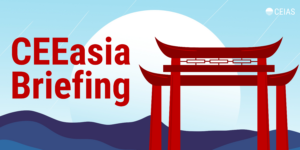Cooperation between Taiwan and the V4 countries — the Czech Republic, Slovakia, Poland and Hungary — has been growing. The V4, or the Visegrad Group, is an informal regional format of cooperation between the four central European countries, which are linked by common geopolitical issues, along with shared cultures and values.
Thanks to their donations of vaccines to Taiwan, these countries gained substantial political goodwill locally. Within and outside Taiwan, the V4 countries — with the exception of Hungary — have gained recognition as European vanguards that have increasingly frequent interactions with Taiwan.
During a telephone conversation on Jan. 28 between President Tsai Ing-wen (蔡英文) and then-Czech president-elect Petr Pavel, for example, he expressed hope for an in-person meeting with Tsai.
Data collected by the EU-Taiwan Tracker — developed by the Central European Institute of Asian Studies — show that the EU recorded a significant increase in Taiwan-related activity from 2019 to last year. In 2019, only 23 interactions were recorded across the entire EU.
Last year, despite the previous three years of the COVID-19 pandemic, the number increased more than sevenfold, with 167 recorded interactions.
Central and eastern European countries were major contributors to this increase, responsible for almost 60 percent of all interactions last year. This has been mostly thanks to the activities of Lithuania, Slovakia, the Czech Republic and Poland — three of which are V4 countries — with the first two having more yearly engagements with Taiwan than major EU member states, such as France and Germany.
Does increased interaction between countries also translate to an increased mutual awareness? The Sinophone Borderlands online poll, conducted from 2020 to last year, examined how Taiwanese perceive people in the Czech Republic, Hungary, Poland and Slovakia, and vice versa. Surveyed were more than 1,350 respondents in each of the five countries.
The poll showed that there is limited mutual knowledge and awareness among Taiwan and the V4 countries. However, there are positive trends that both sides can build upon to improve their images further.
Taiwan is perceived neutrally among the V4 countries. Polish and Czech respondents tended to be slightly more favorable toward Taiwan than Hungarian and Slovak respondents.
Polish respondents were the most positive about Taiwan, with 36 percent expressing positive or very positive feelings, with only 27 percent expressing negative or very negative attitudes.
Accordingly, the average sentiment among Polish respondents toward Taiwan was 53, with 100 being the highest positive indicator and 50 showing neutrality.
A relatively large group of respondents held neutral views of Taiwan compared with neutral perceptions of other actors. This suggests that many people lack a clear, knowledgeable position on Taiwan compared with other powers such as Russia and the US.
Moreover, comparing perceptions toward Taiwan and Japan suggests that a potential exists to improve Taiwan’s image in the region via public diplomacy.
Digging deeper into societal divisions based on socio-demographic variables such as gender, age and education, as well as divisions according to the political preferences of the respondents, the data suggest that those with more awareness and knowledge of Taiwan tend to regard the nation more positively.
Also of interest are divisions based on political party affiliation. Among the V4 countries, political divisions are especially visible in the Czech Republic and Slovakia, and in Poland to a lesser degree. Interestingly, there are no visible differences between voters of Hungary’s governing Fidesz party and its opposition, despite Hungarian Prime Minister Viktor Orban cozying up to China and Russia over the past decade.
Czech political parties have been taking positions on Taiwan driven by their ideologies and strategic outlooks. This finding also aligns with previous studies suggesting that China is a politicized topic in the Czech Republic and that Czech society is polarized in its Taiwan approach.
In Taiwan, the V4 countries are already seen positively — although less so than countries such as Japan, Australia, Germany, Singapore and the US. Taiwanese respondents expressed average perception scores of 59 toward the Czech Republic, 58 toward Slovakia and Hungary, and 62 toward Poland.
For each of the four countries, the share of respondents expressing positive or very positive views ranged from 54 to 65 percent, while the corresponding share of negative or very negative sentiments ranged from 20 to 28 percent.
Supporters of the Democratic Progressive Party were more favorable toward the V4 countries than those who support the Chinese Nationalist Party (KMT). Also, higher education and political interest, among other factors, correlate with more positive views of the V4 countries.
The findings suggest that efficient public diplomacy, which would spread awareness about Taiwan and the V4 countries on both sides, can further improve mutual impressions and understanding. Favorable public opinion on both sides can serve as an important driver for deeper engagements between the countries.
This article was originally published by Taipei Times.








